Managing Employee Performance: The Role of Reward Management
VerifiedAdded on 2023/05/31
|9
|3319
|429
Essay
AI Summary
This essay examines the role of reward management in influencing employee performance, highlighting the importance of performance-related pay and incentives. It discusses issues related to ineffective incentives, the significance of individual performance, and challenges associated with pay-for-performance systems such as negative impacts on cooperation, psychological contracts, and job dissatisfaction. The essay also emphasizes the application of Maslow's hierarchy of needs to enhance employee satisfaction and motivation, advocating for individualized rewards based on performance to boost employee dedication and efficiency. Ultimately, the paper underscores the need for a balanced approach that considers both financial incentives and employee well-being to achieve optimal organizational outcomes.
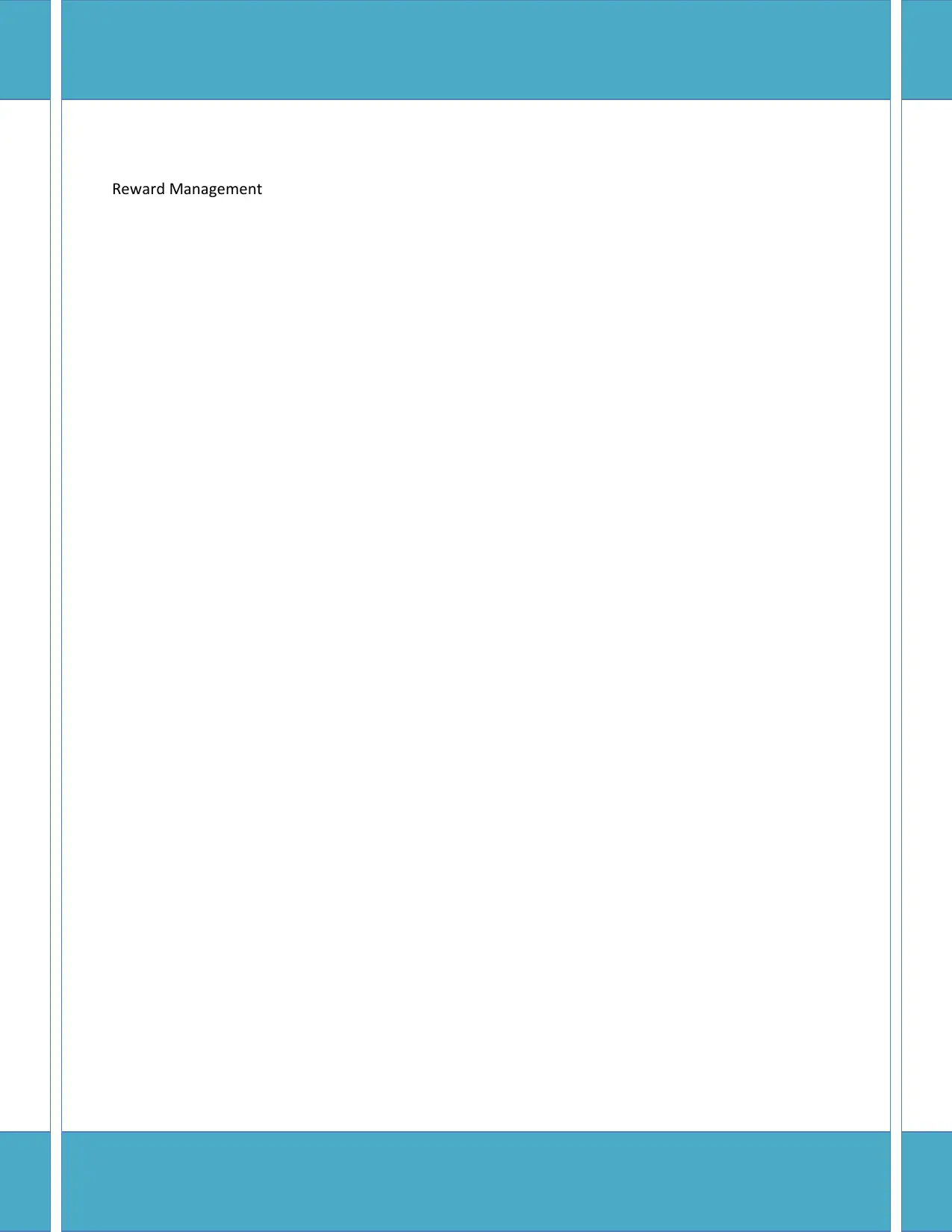
Reward Management
Paraphrase This Document
Need a fresh take? Get an instant paraphrase of this document with our AI Paraphraser
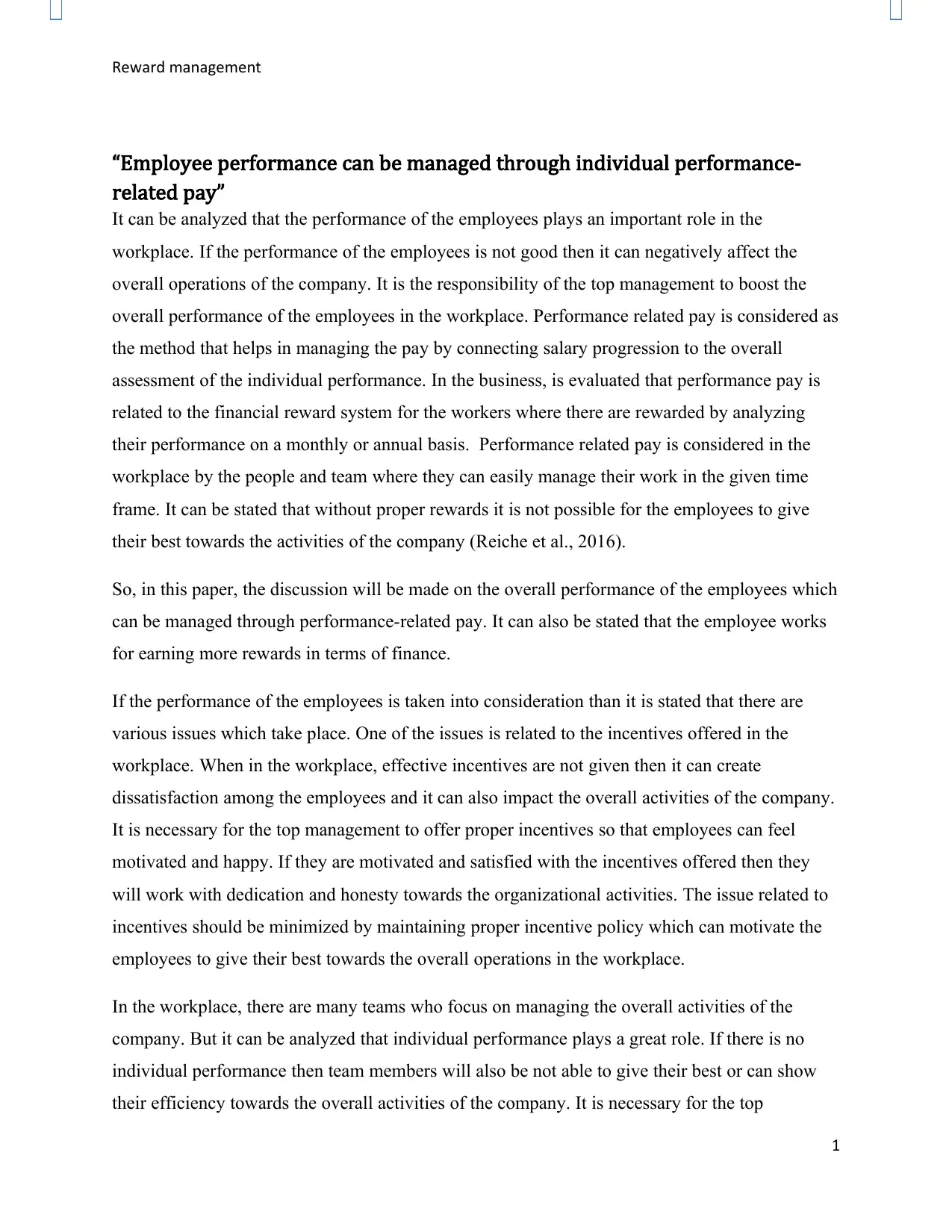
Reward management
“Employee performance can be managed through individual performance-
related pay”
It can be analyzed that the performance of the employees plays an important role in the
workplace. If the performance of the employees is not good then it can negatively affect the
overall operations of the company. It is the responsibility of the top management to boost the
overall performance of the employees in the workplace. Performance related pay is considered as
the method that helps in managing the pay by connecting salary progression to the overall
assessment of the individual performance. In the business, is evaluated that performance pay is
related to the financial reward system for the workers where there are rewarded by analyzing
their performance on a monthly or annual basis. Performance related pay is considered in the
workplace by the people and team where they can easily manage their work in the given time
frame. It can be stated that without proper rewards it is not possible for the employees to give
their best towards the activities of the company (Reiche et al., 2016).
So, in this paper, the discussion will be made on the overall performance of the employees which
can be managed through performance-related pay. It can also be stated that the employee works
for earning more rewards in terms of finance.
If the performance of the employees is taken into consideration than it is stated that there are
various issues which take place. One of the issues is related to the incentives offered in the
workplace. When in the workplace, effective incentives are not given then it can create
dissatisfaction among the employees and it can also impact the overall activities of the company.
It is necessary for the top management to offer proper incentives so that employees can feel
motivated and happy. If they are motivated and satisfied with the incentives offered then they
will work with dedication and honesty towards the organizational activities. The issue related to
incentives should be minimized by maintaining proper incentive policy which can motivate the
employees to give their best towards the overall operations in the workplace.
In the workplace, there are many teams who focus on managing the overall activities of the
company. But it can be analyzed that individual performance plays a great role. If there is no
individual performance then team members will also be not able to give their best or can show
their efficiency towards the overall activities of the company. It is necessary for the top
1
“Employee performance can be managed through individual performance-
related pay”
It can be analyzed that the performance of the employees plays an important role in the
workplace. If the performance of the employees is not good then it can negatively affect the
overall operations of the company. It is the responsibility of the top management to boost the
overall performance of the employees in the workplace. Performance related pay is considered as
the method that helps in managing the pay by connecting salary progression to the overall
assessment of the individual performance. In the business, is evaluated that performance pay is
related to the financial reward system for the workers where there are rewarded by analyzing
their performance on a monthly or annual basis. Performance related pay is considered in the
workplace by the people and team where they can easily manage their work in the given time
frame. It can be stated that without proper rewards it is not possible for the employees to give
their best towards the activities of the company (Reiche et al., 2016).
So, in this paper, the discussion will be made on the overall performance of the employees which
can be managed through performance-related pay. It can also be stated that the employee works
for earning more rewards in terms of finance.
If the performance of the employees is taken into consideration than it is stated that there are
various issues which take place. One of the issues is related to the incentives offered in the
workplace. When in the workplace, effective incentives are not given then it can create
dissatisfaction among the employees and it can also impact the overall activities of the company.
It is necessary for the top management to offer proper incentives so that employees can feel
motivated and happy. If they are motivated and satisfied with the incentives offered then they
will work with dedication and honesty towards the organizational activities. The issue related to
incentives should be minimized by maintaining proper incentive policy which can motivate the
employees to give their best towards the overall operations in the workplace.
In the workplace, there are many teams who focus on managing the overall activities of the
company. But it can be analyzed that individual performance plays a great role. If there is no
individual performance then team members will also be not able to give their best or can show
their efficiency towards the overall activities of the company. It is necessary for the top
1
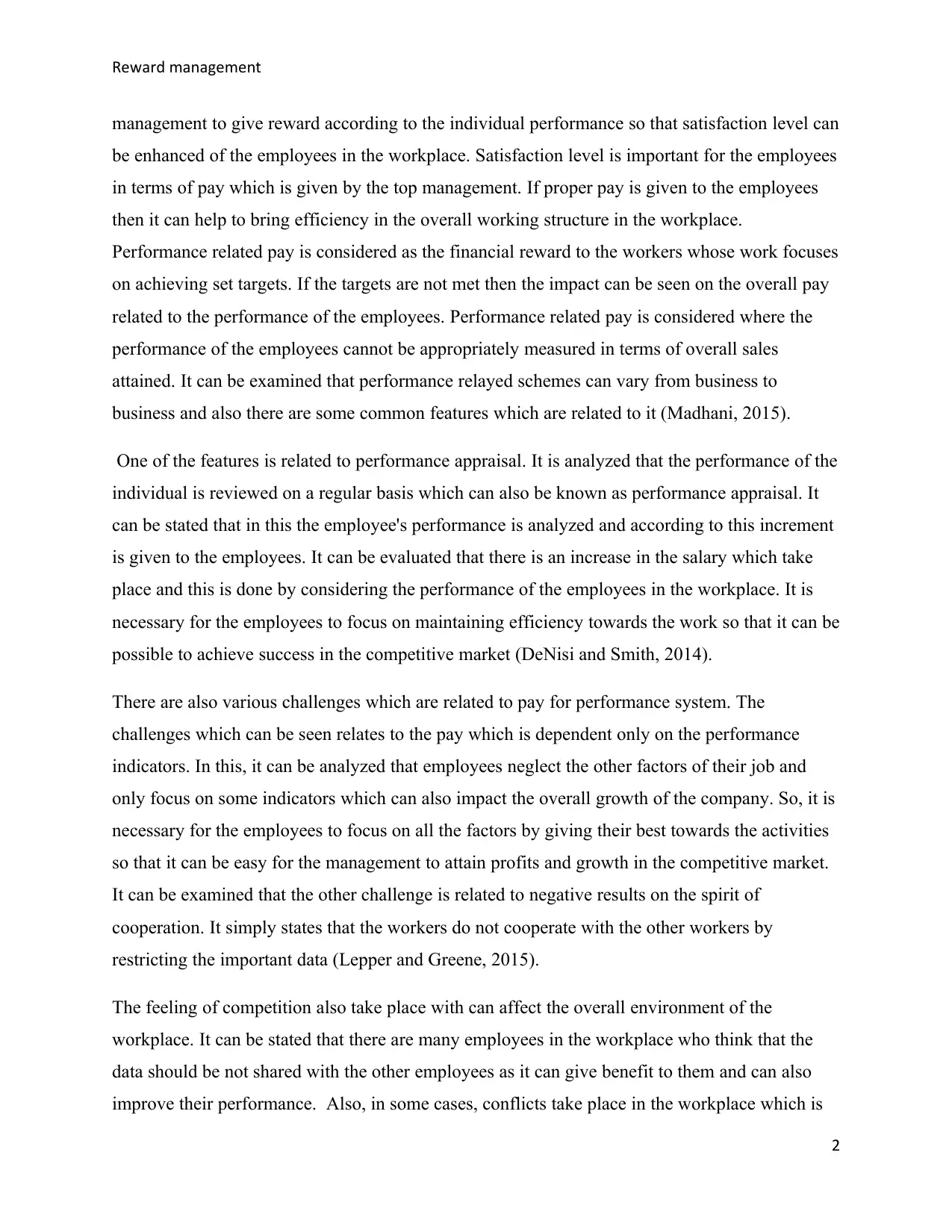
Reward management
management to give reward according to the individual performance so that satisfaction level can
be enhanced of the employees in the workplace. Satisfaction level is important for the employees
in terms of pay which is given by the top management. If proper pay is given to the employees
then it can help to bring efficiency in the overall working structure in the workplace.
Performance related pay is considered as the financial reward to the workers whose work focuses
on achieving set targets. If the targets are not met then the impact can be seen on the overall pay
related to the performance of the employees. Performance related pay is considered where the
performance of the employees cannot be appropriately measured in terms of overall sales
attained. It can be examined that performance relayed schemes can vary from business to
business and also there are some common features which are related to it (Madhani, 2015).
One of the features is related to performance appraisal. It is analyzed that the performance of the
individual is reviewed on a regular basis which can also be known as performance appraisal. It
can be stated that in this the employee's performance is analyzed and according to this increment
is given to the employees. It can be evaluated that there is an increase in the salary which take
place and this is done by considering the performance of the employees in the workplace. It is
necessary for the employees to focus on maintaining efficiency towards the work so that it can be
possible to achieve success in the competitive market (DeNisi and Smith, 2014).
There are also various challenges which are related to pay for performance system. The
challenges which can be seen relates to the pay which is dependent only on the performance
indicators. In this, it can be analyzed that employees neglect the other factors of their job and
only focus on some indicators which can also impact the overall growth of the company. So, it is
necessary for the employees to focus on all the factors by giving their best towards the activities
so that it can be easy for the management to attain profits and growth in the competitive market.
It can be examined that the other challenge is related to negative results on the spirit of
cooperation. It simply states that the workers do not cooperate with the other workers by
restricting the important data (Lepper and Greene, 2015).
The feeling of competition also take place with can affect the overall environment of the
workplace. It can be stated that there are many employees in the workplace who think that the
data should be not shared with the other employees as it can give benefit to them and can also
improve their performance. Also, in some cases, conflicts take place in the workplace which is
2
management to give reward according to the individual performance so that satisfaction level can
be enhanced of the employees in the workplace. Satisfaction level is important for the employees
in terms of pay which is given by the top management. If proper pay is given to the employees
then it can help to bring efficiency in the overall working structure in the workplace.
Performance related pay is considered as the financial reward to the workers whose work focuses
on achieving set targets. If the targets are not met then the impact can be seen on the overall pay
related to the performance of the employees. Performance related pay is considered where the
performance of the employees cannot be appropriately measured in terms of overall sales
attained. It can be examined that performance relayed schemes can vary from business to
business and also there are some common features which are related to it (Madhani, 2015).
One of the features is related to performance appraisal. It is analyzed that the performance of the
individual is reviewed on a regular basis which can also be known as performance appraisal. It
can be stated that in this the employee's performance is analyzed and according to this increment
is given to the employees. It can be evaluated that there is an increase in the salary which take
place and this is done by considering the performance of the employees in the workplace. It is
necessary for the employees to focus on maintaining efficiency towards the work so that it can be
possible to achieve success in the competitive market (DeNisi and Smith, 2014).
There are also various challenges which are related to pay for performance system. The
challenges which can be seen relates to the pay which is dependent only on the performance
indicators. In this, it can be analyzed that employees neglect the other factors of their job and
only focus on some indicators which can also impact the overall growth of the company. So, it is
necessary for the employees to focus on all the factors by giving their best towards the activities
so that it can be easy for the management to attain profits and growth in the competitive market.
It can be examined that the other challenge is related to negative results on the spirit of
cooperation. It simply states that the workers do not cooperate with the other workers by
restricting the important data (Lepper and Greene, 2015).
The feeling of competition also take place with can affect the overall environment of the
workplace. It can be stated that there are many employees in the workplace who think that the
data should be not shared with the other employees as it can give benefit to them and can also
improve their performance. Also, in some cases, conflicts take place in the workplace which is
2
⊘ This is a preview!⊘
Do you want full access?
Subscribe today to unlock all pages.

Trusted by 1+ million students worldwide
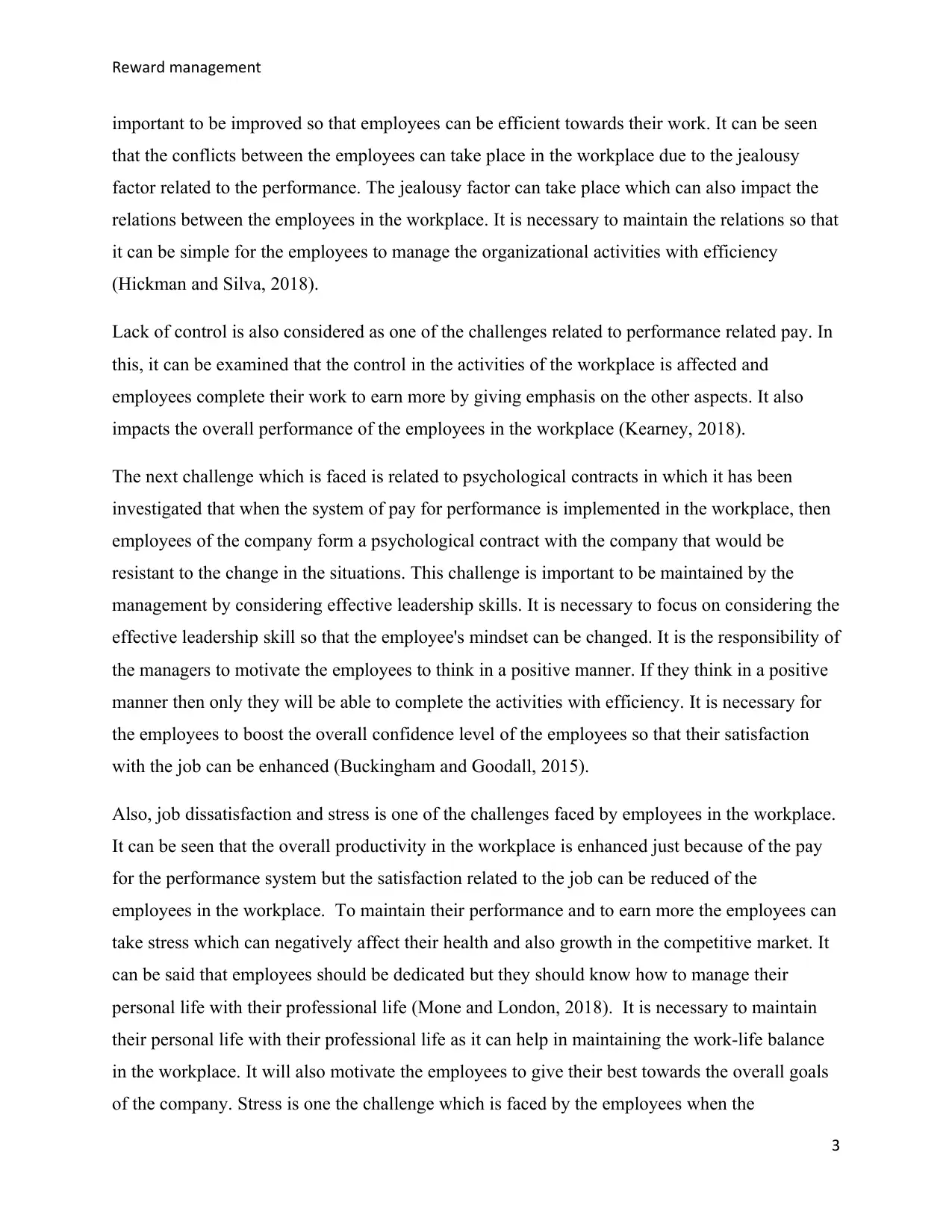
Reward management
important to be improved so that employees can be efficient towards their work. It can be seen
that the conflicts between the employees can take place in the workplace due to the jealousy
factor related to the performance. The jealousy factor can take place which can also impact the
relations between the employees in the workplace. It is necessary to maintain the relations so that
it can be simple for the employees to manage the organizational activities with efficiency
(Hickman and Silva, 2018).
Lack of control is also considered as one of the challenges related to performance related pay. In
this, it can be examined that the control in the activities of the workplace is affected and
employees complete their work to earn more by giving emphasis on the other aspects. It also
impacts the overall performance of the employees in the workplace (Kearney, 2018).
The next challenge which is faced is related to psychological contracts in which it has been
investigated that when the system of pay for performance is implemented in the workplace, then
employees of the company form a psychological contract with the company that would be
resistant to the change in the situations. This challenge is important to be maintained by the
management by considering effective leadership skills. It is necessary to focus on considering the
effective leadership skill so that the employee's mindset can be changed. It is the responsibility of
the managers to motivate the employees to think in a positive manner. If they think in a positive
manner then only they will be able to complete the activities with efficiency. It is necessary for
the employees to boost the overall confidence level of the employees so that their satisfaction
with the job can be enhanced (Buckingham and Goodall, 2015).
Also, job dissatisfaction and stress is one of the challenges faced by employees in the workplace.
It can be seen that the overall productivity in the workplace is enhanced just because of the pay
for the performance system but the satisfaction related to the job can be reduced of the
employees in the workplace. To maintain their performance and to earn more the employees can
take stress which can negatively affect their health and also growth in the competitive market. It
can be said that employees should be dedicated but they should know how to manage their
personal life with their professional life (Mone and London, 2018). It is necessary to maintain
their personal life with their professional life as it can help in maintaining the work-life balance
in the workplace. It will also motivate the employees to give their best towards the overall goals
of the company. Stress is one the challenge which is faced by the employees when the
3
important to be improved so that employees can be efficient towards their work. It can be seen
that the conflicts between the employees can take place in the workplace due to the jealousy
factor related to the performance. The jealousy factor can take place which can also impact the
relations between the employees in the workplace. It is necessary to maintain the relations so that
it can be simple for the employees to manage the organizational activities with efficiency
(Hickman and Silva, 2018).
Lack of control is also considered as one of the challenges related to performance related pay. In
this, it can be examined that the control in the activities of the workplace is affected and
employees complete their work to earn more by giving emphasis on the other aspects. It also
impacts the overall performance of the employees in the workplace (Kearney, 2018).
The next challenge which is faced is related to psychological contracts in which it has been
investigated that when the system of pay for performance is implemented in the workplace, then
employees of the company form a psychological contract with the company that would be
resistant to the change in the situations. This challenge is important to be maintained by the
management by considering effective leadership skills. It is necessary to focus on considering the
effective leadership skill so that the employee's mindset can be changed. It is the responsibility of
the managers to motivate the employees to think in a positive manner. If they think in a positive
manner then only they will be able to complete the activities with efficiency. It is necessary for
the employees to boost the overall confidence level of the employees so that their satisfaction
with the job can be enhanced (Buckingham and Goodall, 2015).
Also, job dissatisfaction and stress is one of the challenges faced by employees in the workplace.
It can be seen that the overall productivity in the workplace is enhanced just because of the pay
for the performance system but the satisfaction related to the job can be reduced of the
employees in the workplace. To maintain their performance and to earn more the employees can
take stress which can negatively affect their health and also growth in the competitive market. It
can be said that employees should be dedicated but they should know how to manage their
personal life with their professional life (Mone and London, 2018). It is necessary to maintain
their personal life with their professional life as it can help in maintaining the work-life balance
in the workplace. It will also motivate the employees to give their best towards the overall goals
of the company. Stress is one the challenge which is faced by the employees when the
3
Paraphrase This Document
Need a fresh take? Get an instant paraphrase of this document with our AI Paraphraser
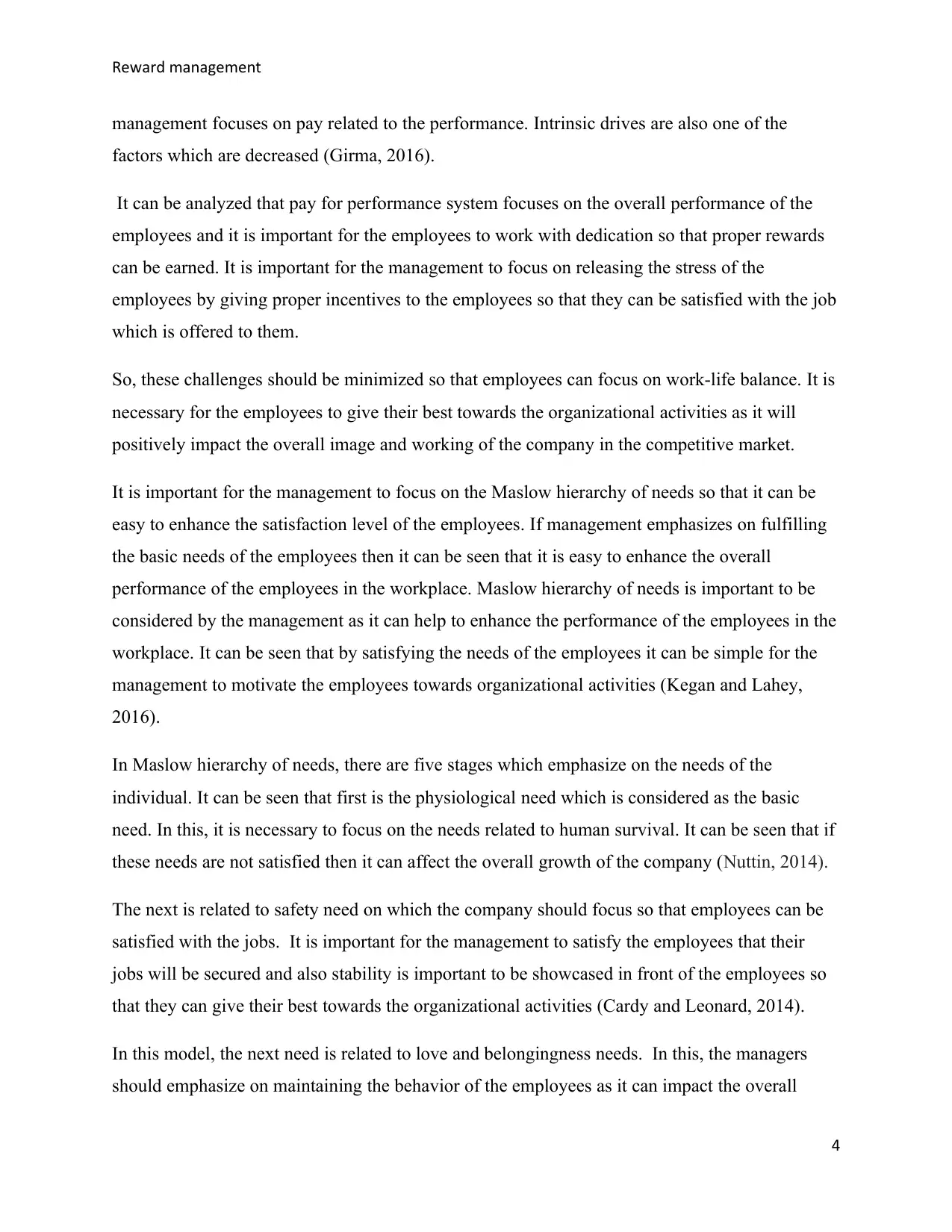
Reward management
management focuses on pay related to the performance. Intrinsic drives are also one of the
factors which are decreased (Girma, 2016).
It can be analyzed that pay for performance system focuses on the overall performance of the
employees and it is important for the employees to work with dedication so that proper rewards
can be earned. It is important for the management to focus on releasing the stress of the
employees by giving proper incentives to the employees so that they can be satisfied with the job
which is offered to them.
So, these challenges should be minimized so that employees can focus on work-life balance. It is
necessary for the employees to give their best towards the organizational activities as it will
positively impact the overall image and working of the company in the competitive market.
It is important for the management to focus on the Maslow hierarchy of needs so that it can be
easy to enhance the satisfaction level of the employees. If management emphasizes on fulfilling
the basic needs of the employees then it can be seen that it is easy to enhance the overall
performance of the employees in the workplace. Maslow hierarchy of needs is important to be
considered by the management as it can help to enhance the performance of the employees in the
workplace. It can be seen that by satisfying the needs of the employees it can be simple for the
management to motivate the employees towards organizational activities (Kegan and Lahey,
2016).
In Maslow hierarchy of needs, there are five stages which emphasize on the needs of the
individual. It can be seen that first is the physiological need which is considered as the basic
need. In this, it is necessary to focus on the needs related to human survival. It can be seen that if
these needs are not satisfied then it can affect the overall growth of the company (Nuttin, 2014).
The next is related to safety need on which the company should focus so that employees can be
satisfied with the jobs. It is important for the management to satisfy the employees that their
jobs will be secured and also stability is important to be showcased in front of the employees so
that they can give their best towards the organizational activities (Cardy and Leonard, 2014).
In this model, the next need is related to love and belongingness needs. In this, the managers
should emphasize on maintaining the behavior of the employees as it can impact the overall
4
management focuses on pay related to the performance. Intrinsic drives are also one of the
factors which are decreased (Girma, 2016).
It can be analyzed that pay for performance system focuses on the overall performance of the
employees and it is important for the employees to work with dedication so that proper rewards
can be earned. It is important for the management to focus on releasing the stress of the
employees by giving proper incentives to the employees so that they can be satisfied with the job
which is offered to them.
So, these challenges should be minimized so that employees can focus on work-life balance. It is
necessary for the employees to give their best towards the organizational activities as it will
positively impact the overall image and working of the company in the competitive market.
It is important for the management to focus on the Maslow hierarchy of needs so that it can be
easy to enhance the satisfaction level of the employees. If management emphasizes on fulfilling
the basic needs of the employees then it can be seen that it is easy to enhance the overall
performance of the employees in the workplace. Maslow hierarchy of needs is important to be
considered by the management as it can help to enhance the performance of the employees in the
workplace. It can be seen that by satisfying the needs of the employees it can be simple for the
management to motivate the employees towards organizational activities (Kegan and Lahey,
2016).
In Maslow hierarchy of needs, there are five stages which emphasize on the needs of the
individual. It can be seen that first is the physiological need which is considered as the basic
need. In this, it is necessary to focus on the needs related to human survival. It can be seen that if
these needs are not satisfied then it can affect the overall growth of the company (Nuttin, 2014).
The next is related to safety need on which the company should focus so that employees can be
satisfied with the jobs. It is important for the management to satisfy the employees that their
jobs will be secured and also stability is important to be showcased in front of the employees so
that they can give their best towards the organizational activities (Cardy and Leonard, 2014).
In this model, the next need is related to love and belongingness needs. In this, the managers
should emphasize on maintaining the behavior of the employees as it can impact the overall
4
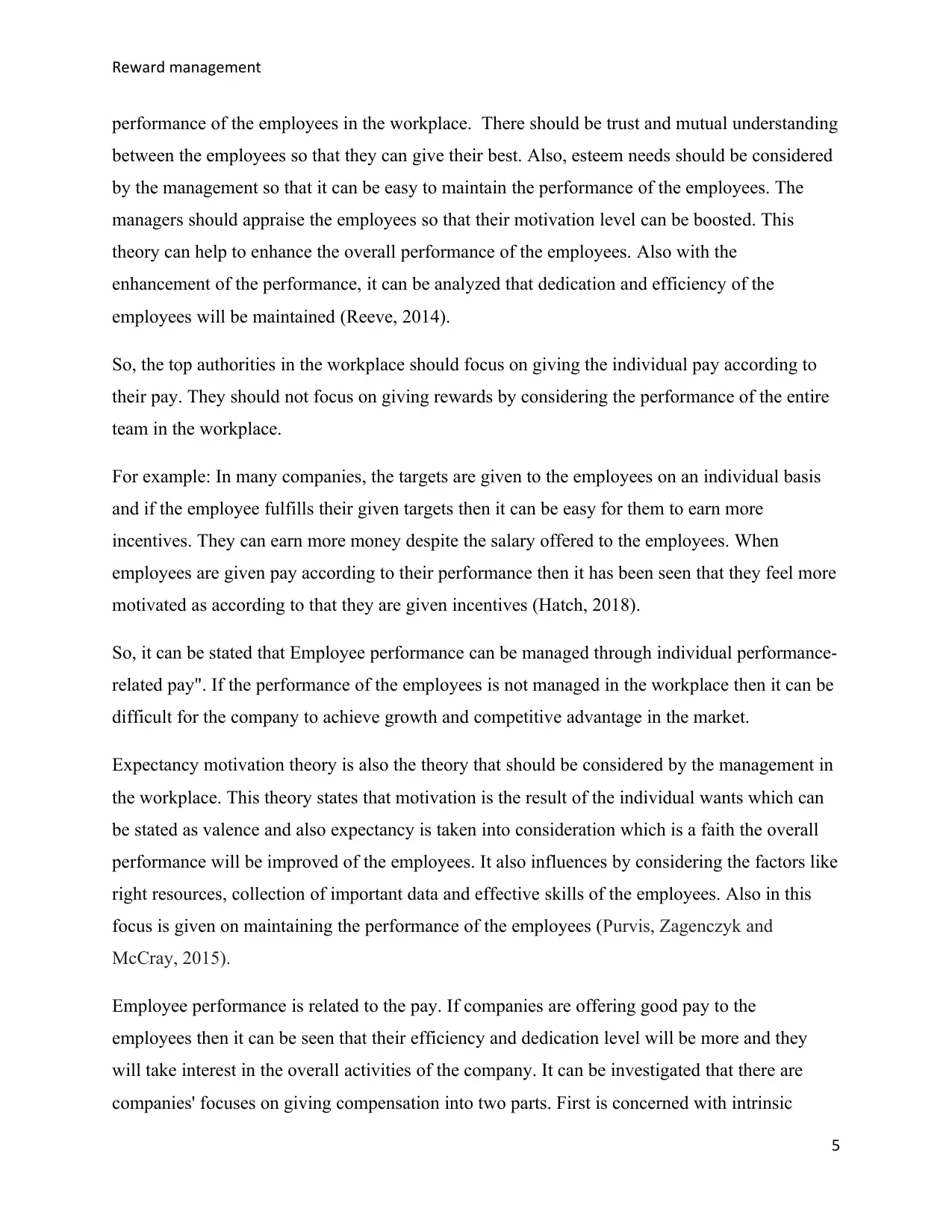
Reward management
performance of the employees in the workplace. There should be trust and mutual understanding
between the employees so that they can give their best. Also, esteem needs should be considered
by the management so that it can be easy to maintain the performance of the employees. The
managers should appraise the employees so that their motivation level can be boosted. This
theory can help to enhance the overall performance of the employees. Also with the
enhancement of the performance, it can be analyzed that dedication and efficiency of the
employees will be maintained (Reeve, 2014).
So, the top authorities in the workplace should focus on giving the individual pay according to
their pay. They should not focus on giving rewards by considering the performance of the entire
team in the workplace.
For example: In many companies, the targets are given to the employees on an individual basis
and if the employee fulfills their given targets then it can be easy for them to earn more
incentives. They can earn more money despite the salary offered to the employees. When
employees are given pay according to their performance then it has been seen that they feel more
motivated as according to that they are given incentives (Hatch, 2018).
So, it can be stated that Employee performance can be managed through individual performance-
related pay". If the performance of the employees is not managed in the workplace then it can be
difficult for the company to achieve growth and competitive advantage in the market.
Expectancy motivation theory is also the theory that should be considered by the management in
the workplace. This theory states that motivation is the result of the individual wants which can
be stated as valence and also expectancy is taken into consideration which is a faith the overall
performance will be improved of the employees. It also influences by considering the factors like
right resources, collection of important data and effective skills of the employees. Also in this
focus is given on maintaining the performance of the employees (Purvis, Zagenczyk and
McCray, 2015).
Employee performance is related to the pay. If companies are offering good pay to the
employees then it can be seen that their efficiency and dedication level will be more and they
will take interest in the overall activities of the company. It can be investigated that there are
companies' focuses on giving compensation into two parts. First is concerned with intrinsic
5
performance of the employees in the workplace. There should be trust and mutual understanding
between the employees so that they can give their best. Also, esteem needs should be considered
by the management so that it can be easy to maintain the performance of the employees. The
managers should appraise the employees so that their motivation level can be boosted. This
theory can help to enhance the overall performance of the employees. Also with the
enhancement of the performance, it can be analyzed that dedication and efficiency of the
employees will be maintained (Reeve, 2014).
So, the top authorities in the workplace should focus on giving the individual pay according to
their pay. They should not focus on giving rewards by considering the performance of the entire
team in the workplace.
For example: In many companies, the targets are given to the employees on an individual basis
and if the employee fulfills their given targets then it can be easy for them to earn more
incentives. They can earn more money despite the salary offered to the employees. When
employees are given pay according to their performance then it has been seen that they feel more
motivated as according to that they are given incentives (Hatch, 2018).
So, it can be stated that Employee performance can be managed through individual performance-
related pay". If the performance of the employees is not managed in the workplace then it can be
difficult for the company to achieve growth and competitive advantage in the market.
Expectancy motivation theory is also the theory that should be considered by the management in
the workplace. This theory states that motivation is the result of the individual wants which can
be stated as valence and also expectancy is taken into consideration which is a faith the overall
performance will be improved of the employees. It also influences by considering the factors like
right resources, collection of important data and effective skills of the employees. Also in this
focus is given on maintaining the performance of the employees (Purvis, Zagenczyk and
McCray, 2015).
Employee performance is related to the pay. If companies are offering good pay to the
employees then it can be seen that their efficiency and dedication level will be more and they
will take interest in the overall activities of the company. It can be investigated that there are
companies' focuses on giving compensation into two parts. First is concerned with intrinsic
5
⊘ This is a preview!⊘
Do you want full access?
Subscribe today to unlock all pages.

Trusted by 1+ million students worldwide
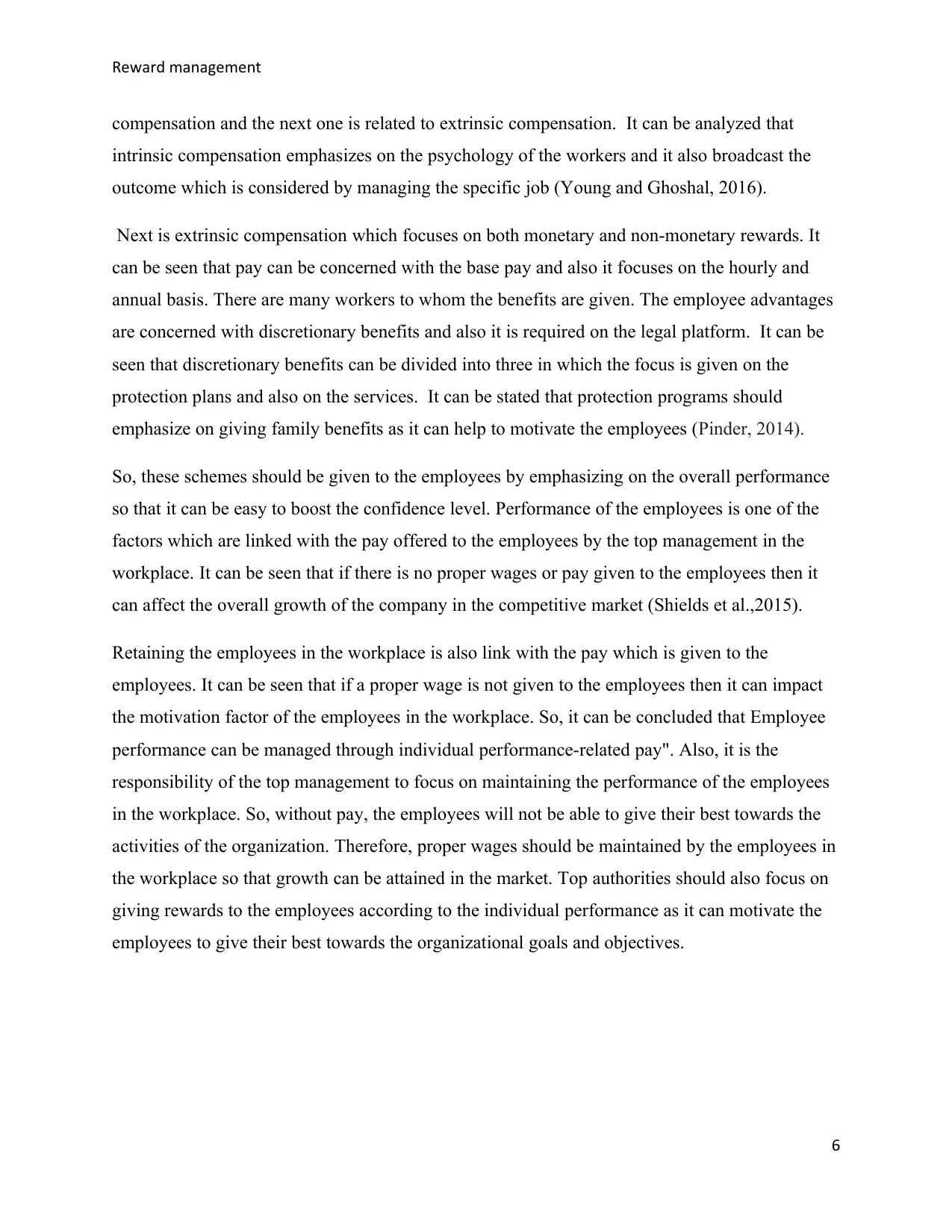
Reward management
compensation and the next one is related to extrinsic compensation. It can be analyzed that
intrinsic compensation emphasizes on the psychology of the workers and it also broadcast the
outcome which is considered by managing the specific job (Young and Ghoshal, 2016).
Next is extrinsic compensation which focuses on both monetary and non-monetary rewards. It
can be seen that pay can be concerned with the base pay and also it focuses on the hourly and
annual basis. There are many workers to whom the benefits are given. The employee advantages
are concerned with discretionary benefits and also it is required on the legal platform. It can be
seen that discretionary benefits can be divided into three in which the focus is given on the
protection plans and also on the services. It can be stated that protection programs should
emphasize on giving family benefits as it can help to motivate the employees (Pinder, 2014).
So, these schemes should be given to the employees by emphasizing on the overall performance
so that it can be easy to boost the confidence level. Performance of the employees is one of the
factors which are linked with the pay offered to the employees by the top management in the
workplace. It can be seen that if there is no proper wages or pay given to the employees then it
can affect the overall growth of the company in the competitive market (Shields et al.,2015).
Retaining the employees in the workplace is also link with the pay which is given to the
employees. It can be seen that if a proper wage is not given to the employees then it can impact
the motivation factor of the employees in the workplace. So, it can be concluded that Employee
performance can be managed through individual performance-related pay". Also, it is the
responsibility of the top management to focus on maintaining the performance of the employees
in the workplace. So, without pay, the employees will not be able to give their best towards the
activities of the organization. Therefore, proper wages should be maintained by the employees in
the workplace so that growth can be attained in the market. Top authorities should also focus on
giving rewards to the employees according to the individual performance as it can motivate the
employees to give their best towards the organizational goals and objectives.
6
compensation and the next one is related to extrinsic compensation. It can be analyzed that
intrinsic compensation emphasizes on the psychology of the workers and it also broadcast the
outcome which is considered by managing the specific job (Young and Ghoshal, 2016).
Next is extrinsic compensation which focuses on both monetary and non-monetary rewards. It
can be seen that pay can be concerned with the base pay and also it focuses on the hourly and
annual basis. There are many workers to whom the benefits are given. The employee advantages
are concerned with discretionary benefits and also it is required on the legal platform. It can be
seen that discretionary benefits can be divided into three in which the focus is given on the
protection plans and also on the services. It can be stated that protection programs should
emphasize on giving family benefits as it can help to motivate the employees (Pinder, 2014).
So, these schemes should be given to the employees by emphasizing on the overall performance
so that it can be easy to boost the confidence level. Performance of the employees is one of the
factors which are linked with the pay offered to the employees by the top management in the
workplace. It can be seen that if there is no proper wages or pay given to the employees then it
can affect the overall growth of the company in the competitive market (Shields et al.,2015).
Retaining the employees in the workplace is also link with the pay which is given to the
employees. It can be seen that if a proper wage is not given to the employees then it can impact
the motivation factor of the employees in the workplace. So, it can be concluded that Employee
performance can be managed through individual performance-related pay". Also, it is the
responsibility of the top management to focus on maintaining the performance of the employees
in the workplace. So, without pay, the employees will not be able to give their best towards the
activities of the organization. Therefore, proper wages should be maintained by the employees in
the workplace so that growth can be attained in the market. Top authorities should also focus on
giving rewards to the employees according to the individual performance as it can motivate the
employees to give their best towards the organizational goals and objectives.
6
Paraphrase This Document
Need a fresh take? Get an instant paraphrase of this document with our AI Paraphraser
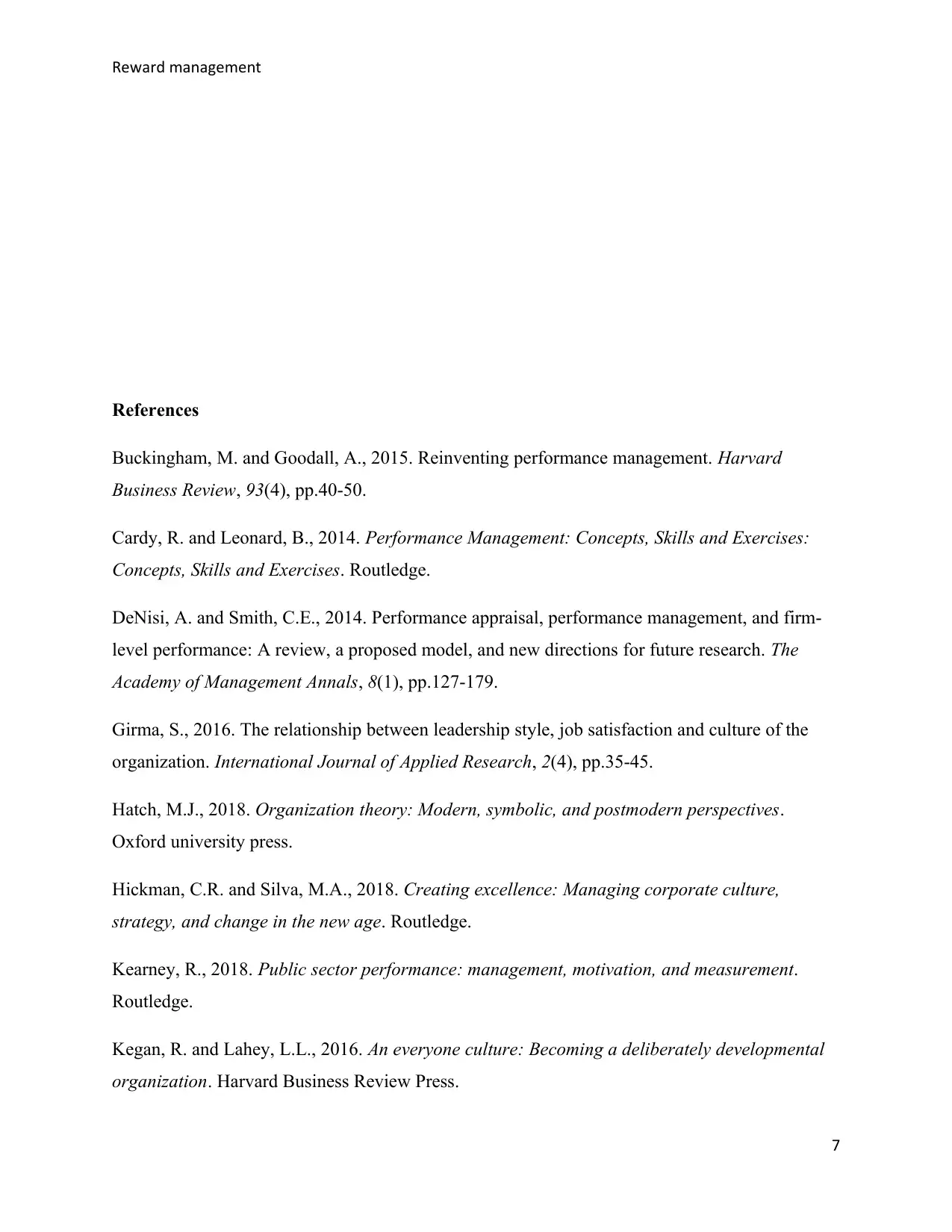
Reward management
References
Buckingham, M. and Goodall, A., 2015. Reinventing performance management. Harvard
Business Review, 93(4), pp.40-50.
Cardy, R. and Leonard, B., 2014. Performance Management: Concepts, Skills and Exercises:
Concepts, Skills and Exercises. Routledge.
DeNisi, A. and Smith, C.E., 2014. Performance appraisal, performance management, and firm-
level performance: A review, a proposed model, and new directions for future research. The
Academy of Management Annals, 8(1), pp.127-179.
Girma, S., 2016. The relationship between leadership style, job satisfaction and culture of the
organization. International Journal of Applied Research, 2(4), pp.35-45.
Hatch, M.J., 2018. Organization theory: Modern, symbolic, and postmodern perspectives.
Oxford university press.
Hickman, C.R. and Silva, M.A., 2018. Creating excellence: Managing corporate culture,
strategy, and change in the new age. Routledge.
Kearney, R., 2018. Public sector performance: management, motivation, and measurement.
Routledge.
Kegan, R. and Lahey, L.L., 2016. An everyone culture: Becoming a deliberately developmental
organization. Harvard Business Review Press.
7
References
Buckingham, M. and Goodall, A., 2015. Reinventing performance management. Harvard
Business Review, 93(4), pp.40-50.
Cardy, R. and Leonard, B., 2014. Performance Management: Concepts, Skills and Exercises:
Concepts, Skills and Exercises. Routledge.
DeNisi, A. and Smith, C.E., 2014. Performance appraisal, performance management, and firm-
level performance: A review, a proposed model, and new directions for future research. The
Academy of Management Annals, 8(1), pp.127-179.
Girma, S., 2016. The relationship between leadership style, job satisfaction and culture of the
organization. International Journal of Applied Research, 2(4), pp.35-45.
Hatch, M.J., 2018. Organization theory: Modern, symbolic, and postmodern perspectives.
Oxford university press.
Hickman, C.R. and Silva, M.A., 2018. Creating excellence: Managing corporate culture,
strategy, and change in the new age. Routledge.
Kearney, R., 2018. Public sector performance: management, motivation, and measurement.
Routledge.
Kegan, R. and Lahey, L.L., 2016. An everyone culture: Becoming a deliberately developmental
organization. Harvard Business Review Press.
7
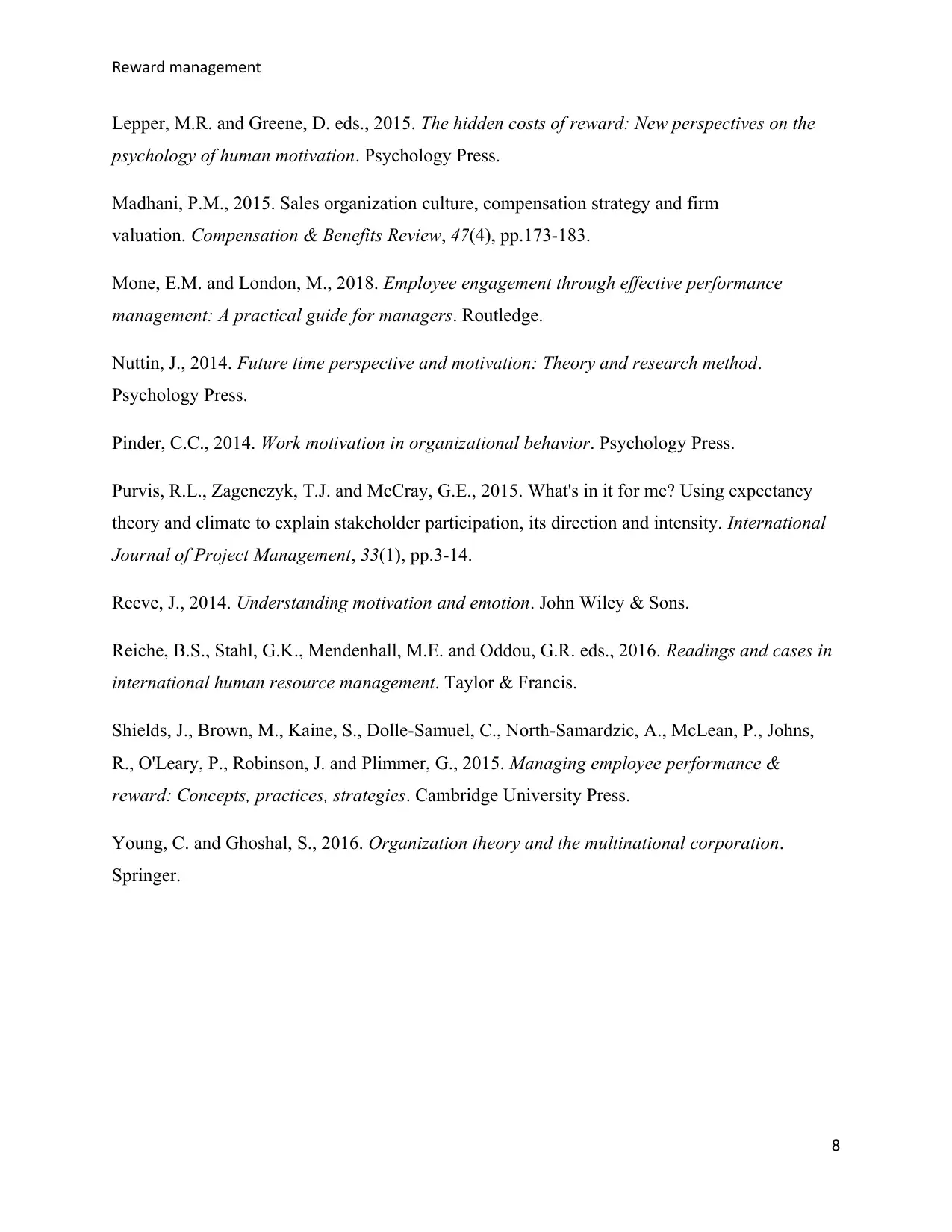
Reward management
Lepper, M.R. and Greene, D. eds., 2015. The hidden costs of reward: New perspectives on the
psychology of human motivation. Psychology Press.
Madhani, P.M., 2015. Sales organization culture, compensation strategy and firm
valuation. Compensation & Benefits Review, 47(4), pp.173-183.
Mone, E.M. and London, M., 2018. Employee engagement through effective performance
management: A practical guide for managers. Routledge.
Nuttin, J., 2014. Future time perspective and motivation: Theory and research method.
Psychology Press.
Pinder, C.C., 2014. Work motivation in organizational behavior. Psychology Press.
Purvis, R.L., Zagenczyk, T.J. and McCray, G.E., 2015. What's in it for me? Using expectancy
theory and climate to explain stakeholder participation, its direction and intensity. International
Journal of Project Management, 33(1), pp.3-14.
Reeve, J., 2014. Understanding motivation and emotion. John Wiley & Sons.
Reiche, B.S., Stahl, G.K., Mendenhall, M.E. and Oddou, G.R. eds., 2016. Readings and cases in
international human resource management. Taylor & Francis.
Shields, J., Brown, M., Kaine, S., Dolle-Samuel, C., North-Samardzic, A., McLean, P., Johns,
R., O'Leary, P., Robinson, J. and Plimmer, G., 2015. Managing employee performance &
reward: Concepts, practices, strategies. Cambridge University Press.
Young, C. and Ghoshal, S., 2016. Organization theory and the multinational corporation.
Springer.
8
Lepper, M.R. and Greene, D. eds., 2015. The hidden costs of reward: New perspectives on the
psychology of human motivation. Psychology Press.
Madhani, P.M., 2015. Sales organization culture, compensation strategy and firm
valuation. Compensation & Benefits Review, 47(4), pp.173-183.
Mone, E.M. and London, M., 2018. Employee engagement through effective performance
management: A practical guide for managers. Routledge.
Nuttin, J., 2014. Future time perspective and motivation: Theory and research method.
Psychology Press.
Pinder, C.C., 2014. Work motivation in organizational behavior. Psychology Press.
Purvis, R.L., Zagenczyk, T.J. and McCray, G.E., 2015. What's in it for me? Using expectancy
theory and climate to explain stakeholder participation, its direction and intensity. International
Journal of Project Management, 33(1), pp.3-14.
Reeve, J., 2014. Understanding motivation and emotion. John Wiley & Sons.
Reiche, B.S., Stahl, G.K., Mendenhall, M.E. and Oddou, G.R. eds., 2016. Readings and cases in
international human resource management. Taylor & Francis.
Shields, J., Brown, M., Kaine, S., Dolle-Samuel, C., North-Samardzic, A., McLean, P., Johns,
R., O'Leary, P., Robinson, J. and Plimmer, G., 2015. Managing employee performance &
reward: Concepts, practices, strategies. Cambridge University Press.
Young, C. and Ghoshal, S., 2016. Organization theory and the multinational corporation.
Springer.
8
⊘ This is a preview!⊘
Do you want full access?
Subscribe today to unlock all pages.

Trusted by 1+ million students worldwide
1 out of 9
Related Documents
Your All-in-One AI-Powered Toolkit for Academic Success.
+13062052269
info@desklib.com
Available 24*7 on WhatsApp / Email
![[object Object]](/_next/static/media/star-bottom.7253800d.svg)
Unlock your academic potential
Copyright © 2020–2026 A2Z Services. All Rights Reserved. Developed and managed by ZUCOL.





